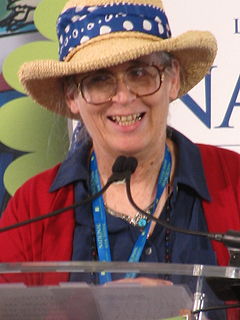A Quote by Elizabeth Moon
There are relatively few science fiction or fantasy books with the main character being an old person.
Related Quotes
Science fiction is fantasy about issues of science. Science fiction is a subset of fantasy. Fantasy predated it by several millennia. The '30s to the '50s were the golden age of science fiction - this was because, to a large degree, it was at this point that technology and science had exposed its potential without revealing the limitations.
I find it interesting that authors of fantasy and science fiction novels are rarely asked if their books are based on their personal experiences, because all writing is based on personal experience. I may not have gone on an epic quest through a haunted forest, but the feelings in my books are often based on feelings I've had. Real-life events, in fantasy and science fiction, can take on metaphorical significance that they can't in a so-called realistic novel.
'Filk' is the folk music of the science fiction and fantasy community - you get parodies, you get traditional music that's had the words slightly modified, and you'll also get just original works that have been written about science fiction and fantasy works, or with science fiction and fantasy themes.
Science fiction is a weird category, because it's the only area of fiction I can think of where the story is not of primary importance. Science fiction tends to be more about the science, or the invention of the fantasy world, or the political allegory. When I left science fiction, I said "They're more interested in planets, and I'm interested in people."
A precondition for being a science fiction writer other than an interest in the future is that, an interest - at least an understanding of science, not necessarily a science degree but you must have a feeling for the science and its possibilities and its impossibilities, otherwise you're writing fantasy. Now, fantasy is also fine, but there is a distinction, although no one's ever been able to say just where the dividing lines come.
I define science fiction as the art of the possible. Fantasy is the art of the impossible. Science fiction, again, is the history of ideas, and they're always ideas that work themselves out and become real and happen in the world. And fantasy comes along and says, 'We're going to break all the laws of physics.' ... Most people don't realize it, but the series of films which have made more money than any other series of films in the history of the universe is the James Bond series. They're all science fiction, too - romantic, adventurous, frivolous, fantastic science fiction!
Much blood has also been spilled on the carpet in attempts to distinguish between science fiction and fantasy. I have suggested an operational definition: science fiction is something that COULD happen - but usually you wouldn't want it to. Fantasy is something that COULDN'T happen - though often you only wish that it could.

































